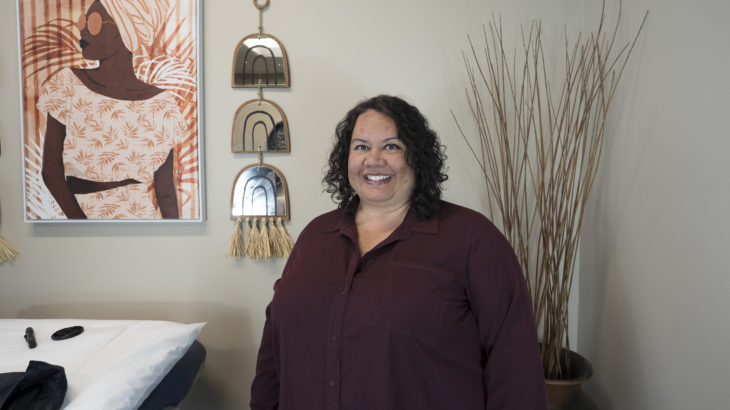Bella Tukuafu Johnson, a founder in the University of Utah’s Master of Business Creation (MBC) program, is reshaping the landscape of clinical research through her startup, Kalo Clinical Research. It helps pharmaceutical companies make better medicine by including diverse and underrepresented communities in their studies.
“We hope to stand as a beacon to all clinical research sites in our industry for equity and inclusion of all people as we improve medicine and health for humanity as a whole,” Johnson said.
What sets Kalo Clinical Research apart is its commitment to inclusivity within clinical trials. Johnson’s company overcomes the common barriers to that have hindered access in the past by establishing research sites in underrepresented communities, ensuring a diverse representation that larger networks often struggle to achieve.
The Problem with Clinical Trials
Until recently, researchers assumed that what they learned from white (mostly male) participants who historically made up about 85-90% of trial participants could be safely applied to anybody, according to the National Institutes of Health. However, gender, race, ethnicity, and other variables do matter in how safe or efficient medicine works, and that no single group can truly represent us all.
The FDA has approved medications proven to be safe and effective for overwhelmingly white study participants, but these drugs do not necessarily work the same for minority populations. Unfortunately, health disparities exist among racial and ethnic minorities where they experience more preventable diseases and poorer health outcomes, yet they are not included in research studies as often as white people are.
Health disparities experienced by minority populations are complex and can have many other causes, but without understanding the mechanisms that underly them they can’t be reduced. Creating access to clinical trials for historically underrepresented communities in health research is a driving mechanism for bringing data that can help us understand them, at least in part.
People simply may experience the same disease differently and it is essential that clinical trials include diverse populations so that all communities can benefit from scientific advances. It is essential to have a wide range of people from different communities participate in clinical trials to reduce biases, promote social justice and health equity, and produce more innovative science, according to the National Institute on Minority Health and Health Disparities.
A Closer Look Through Case Studies
Clopidegrel
Clopidegrel, an anti-platelet drug commonly used to reduce the risk of blood clots and help protect you from having a stroke or heart attack is no better than a placebo for 75% of Pacific Islanders who take it. In 2014, Native Hawaiians and Pacific Islanders were almost four times more likely than white adults to have a stroke, and 30% more likely to die from a stroke comparatively.
Creating access to clinical trials for Pacific Islanders allows us to get additional data on medications from this population to potentially determine what works better for common health disparities, including heart disease.
Source: https://pubmed.ncbi.nlm.nih.gov/29771642/
Carbamezepine
Carbamezepine, a drug used to treat seizures and nerve pain, is more likely to cause Stevens-Johnson syndrome which is a rare, serious disorder of the skin and mucous membranes in Asians than in other racial groups.
Creating access to clinical trials for Asians can help determine side effects or adverse reactions that aren’t commonly found in other populations.
Source: https://pubmed.ncbi.nlm.nih.gov/15057820/
Prostate Cancer
African American men currently represent only about 2% of clinical trial participants in prostate cancer trials, yet they are twice as likely as white men to be affected by and die from the disease.
Creating access to clinical trials for the African American population can help educate and empower people to participate and offer data that can potentially reduce the amount of unnecessary death within that community, specifically from prostate cancer.
Source: https://seer.cancer.gov/statfacts/html/prost.html
Chronic Liver Disease
Clinical trials of chronic liver disease should include Hispanic men and women who have double the rate this than their non-Hispanic white counterparts.
Creating access to clinical trials for Hispanic men and women can potentially provide the data necessary for improving outcomes of chronic liver disease by improving current treatments and/or discovering medication that works more specifically and directly toward this indication.
Source: https://seer.cancer.gov/statfacts/html/prost.html

Kalo Clinical Research exam rooms are designed to inspire equity and inclusion.
Launching Kalo Clinical Research
Born and raised in Punalu’u, Hawaii, amidst a supportive family, Johnson’s journey led her to Brigham Young University and then to the University of Utah, where she worked in health research for over 20 years. Unexpectedly thrust into entrepreneurship, she acquired and transformed a struggling clinical research company into the thriving entity that is Kalo Clinical Research today.
In 2022, Kalo Clinical Research relocated its research clinic from an affluent area in Salt Lake City to the heart of West Valley City, Utah, creating immediate geographical support to those who have not known clinical trials was even an option, garnering widespread community support.
Looking ahead, Kalo Clinical Research aspires to be a leading example of equity and inclusion in the clinical research industry.
“In the realm of social justice, diversity, equity and inclusion, it is so exciting to represent hope and progress with tangible steps and real evidence that we are making a difference,” Johnson said. She envisions expanding to build additional sites in other historically underrepresented populations, ensuring that access to clinical trials is not a barrier to participation and inclusion.
Growing the Company
Enrolling in the Master of Business Creation program was a pivotal decision for Johnson, who initially struggled with the complexities of running a business. “The program’s hands-on approach and direct application of concepts to my company has uniquely allowed me to put into motion what has taken me years to conceptually grasp,” she said.
What makes the MBC program unique, according to Johnson, is its practicality and the trust it instills in entrepreneurs to implement concepts swiftly. She emphasized the program’s structure and the collective expertise of its founders and professors, describing them as phenomenal and genuinely invested in the success of their students.
Learn more about Kalo Clinical Research at kaloresearch.com.



